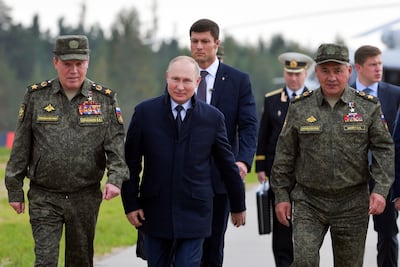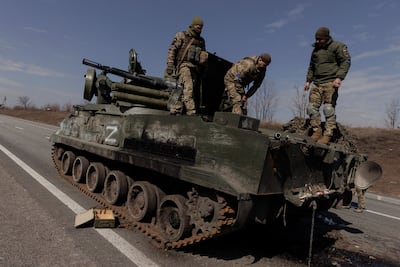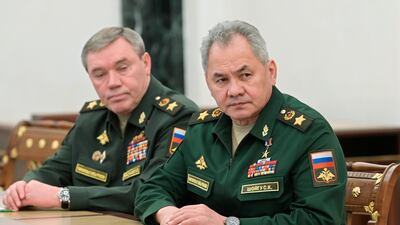Live updates: follow the latest news on Russia-Ukraine
For the two men who planned the flawed invasion of Ukraine, responsibility for Russia’s inept attack means that they must account for the thousands of their own men killed in a month, military analysts have suggested.
Generals Valery Gerasimov and Sergei Shoigu, the respective Chief of the General Staff and Minister for Defence, both 66, have overseen an unimaginable scale of loss for a modern army.

Since his appointment a decade ago, the chief of staff has won respect for introducing the “Gerasimov doctrine”, an approach that fused military, diplomacy, cultural, information, war and technological domains to attain a strategic goal.
“He struck me as quite a thoughtful soldier and some of his doctrine made a lot of sense,” retired Brigadier Ben Barry of the IISS think tank said. “He made several major speeches analysing the changing character of combat of war, including drawing on lessons from Russian operations in Syria.”
What went wrong?
Leading military strategist Prof Michael Clarke suggests Gen Gerasimov is not “a flexible thinker” and was not a “young, well-promoted tyro” in the fashion that the Red Army often produced.
Gen Gerasimov’s doctrine has either been ignored or proved unworkable against determined resistance by Ukraine or “they obviously didn't train for it at a high enough level of detail”, said the Rusi think tank academic.
The lack of a single, overall commander in charge of the campaign has been a glaring omission, said Col Richard Kemp, a retired British officer. “That there’s no one tying it all together is a significant failure, particularly when you look at the use of reserves, aircraft and artillery which should be switched around between different elements of a campaign. If you don’t have someone to co-ordinate that, it makes fighting much more difficult.”

Gen Shoigu was also part of Soviet-era management where endemic corruption and blame deflection formed a malaise that is clearly still sustained in the Russian army.
“The forces are very corrupt, very inefficient and the cumulative effect leads to senior levels being told that ‘this and this’ have been done,” said Prof Clarke. “Everybody says everything's fine when actually it isn't and when a training exercise suddenly becomes a combat operation, all the deficiencies which had been tolerated or turned a blind eye to suddenly become very important.”
Gen Shoigu is also not a real general. The title came with his ministerial post after he was promoted from the Emergencies Ministry when his predecessor was fired in 2012.
Despite coming from outside the president’s cabal of former KGB officers and of Tuvan-Turkic heritage, Gen Shoigu has formed a bond with Mr Putin and was unquestionably deeply involved in planning the invasion, albeit in a tiny group that gave the military little time to plan for a complex, all-arms attack.
“Demonstrating competence as emergencies minister did make he seem to be a safe pair of hands,” said Brig Barry. “But the apparent failure of logistics can be laid Gen Shoigu’s feet.”
With his ethnic background, racism might be undermining Gen Shoigu from within the oligarchs and former KGB cohort, Prof Clarke said.
“There is a degree of closet racism around,” he said. “Gen Shoigu is also a very buttoned-up character and he's not a real Putin man, in the way that others are. He's a bit detached and it’s been rumoured for some time that he has a heart problem.”

Gen Shoigu, a fluent speaker of nine languages, including English and Chinese, led defence during the 2014 invasion of Crimea and a year later in Syria.
Gen Gerasimov has also picked up operational experience both from the Second Chechen War and in 2014 where he was allegedly the general in charge of the Battle of Illovaisk in which 1,000 Ukrainian soldiers were killed.
But that appears to have been a sham, as it was in the Cold War. “I witnessed the Soviet Army in the 1980s in East Germany where they were a pretty ramshackle bunch when everyone thought they were Superman,” said Col Kemp, a former British Army commander in Afghanistan. “They were widely feared but actually, when you saw them up close the vehicles were rusting, improperly maintained and the soldiers were undisciplined. I'm guessing that that's continued.”
However, all might not be lost for the generals. After the D-Day landings in 1944 – possibly the most intricately planned military operation – it took seven weeks for the Allies to break out of Normandy.
“Two things could happen,” said Brig Barry. “If the Russians gain air superiority that would make life very difficult for movement of Ukraine’s supplies. And what if President [Volodymyr] Zelenskyy is killed? His leadership is a public projection of determination and the national will alongside a very savvy social media operation like that of music stars Rihanna or Adele.”
But it may also be that the two generals, working with the security services, decide that Putin’s time is over. “It’s a question then of someone putting the knife in first,” said Prof Clarke. “Then it will be like the Julius Caesar scenario – once one person has stabbed him politically, everybody else will pile in quickly.”
Mr Putin, though, has not survived in the Kremlin for four decades without a well-refined instinct. It could be that the generals receive the blade first.
“My hunch is they take responsibility for this,” said Prof Clarke.
Previous victories in Ukraine, Syria and perhaps Libya might also have convinced the high command of their superiority.
Or they may just have been set an impossible task by Mr Putin, argues Prof Clarke. “They were given the impossible to perform and now they're getting blamed for not doing the impossible.”
That a brigade of paratroopers and Spetsnaz special forces – regarded as equals to Britain and America’s troops – were defeated in the early days suggests dreadful planning and intelligence, he said.









































